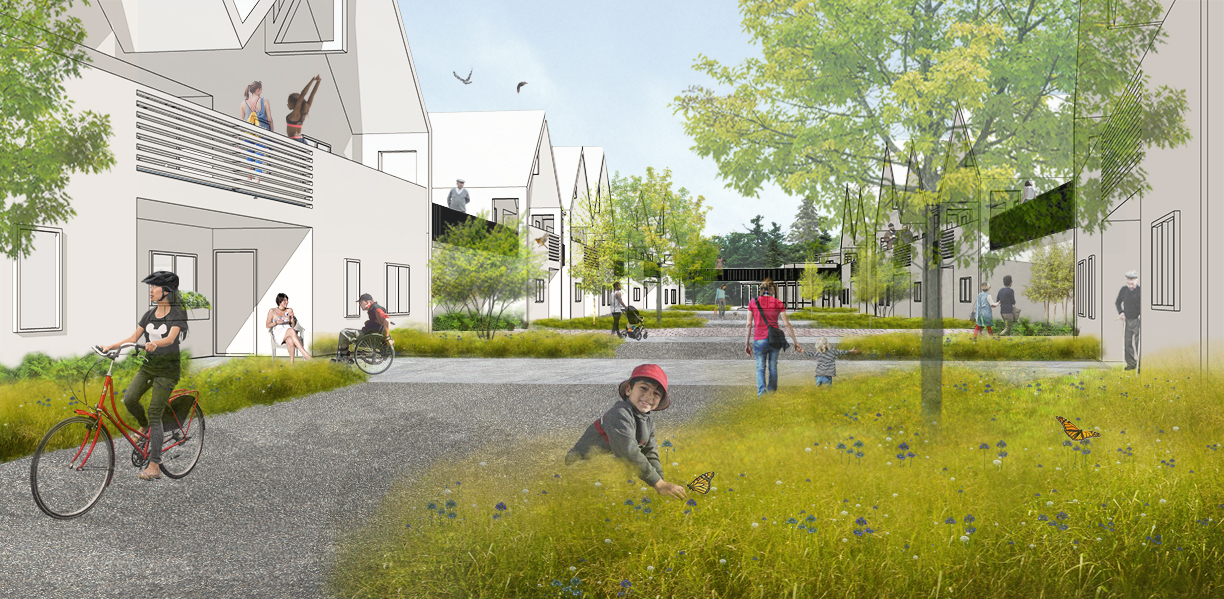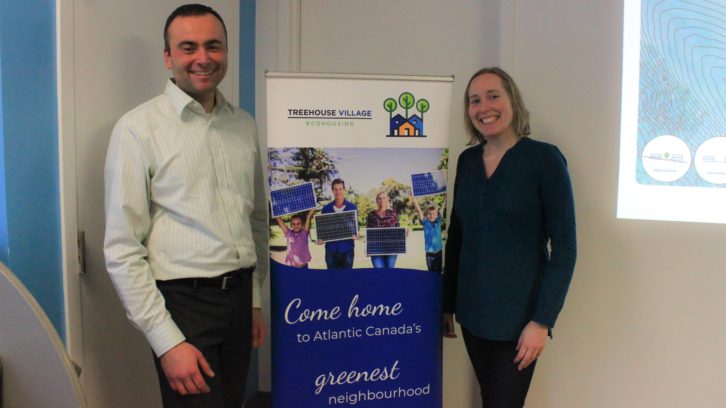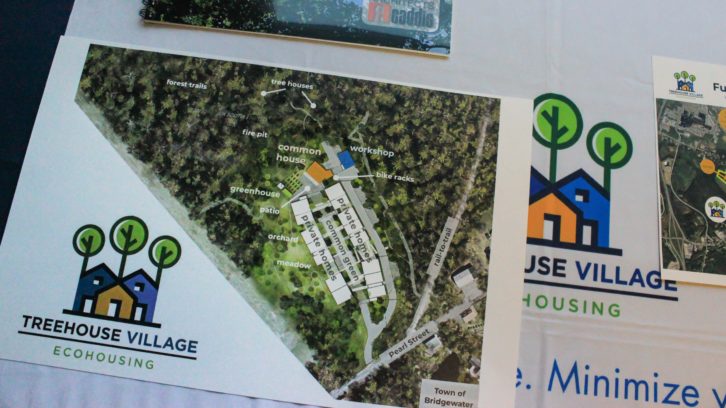Crowd gathers in Bedford to learn about first cohousing community in Atlantic Canada
Based in Bridgewater, Treehouse Village Ecohousing offers an alternative way of living

caption
Digital rendering of Treehouse Village Echousing in Bridgewater, N.S. There are currently 14 completed cohousing communities in Canada. Treehouse Village will be the first in the Atlantic region.About 30 people attended an information session in Bedford on Saturday to learn more about cohousing.
The event hosted by Bridgewater-based Treehouse Village Ecohousing drew people from Halifax and surrounding areas, reflecting the growing interest in cohousing.
The concept combines the privacy of owning a home with the opportunity to share resources and have close relationships with neighbours. It is popular on the West Coast, with wait lists for existing communities exceeding the hundreds.
Eli Gordon travelled to the information session from Halifax, curious if it might be a good fit for his family.
“I’ve been interested in the cohousing model for a while,” said Gordon. “I want a house, but I also really like living in community, so it seems like a really great balance.”
Attendees ranged from people in their mid-20s to people in their mid-70s. Some were single, some retired, and some were young families. The goal of the community is to create a welcoming, supportive, and sustainable neighbourhood for people of all ages.
Cate de Vreede and her husband Leon planted the seed for Treehouse Village Ecohousing in late 2018. And after holding their first information session—which had almost 70 people in attendance—their dream didn’t feel so out of reach.
“We realized that this was something beyond just a dream of ours,” said de Vreede.
“This was something that was resonating with a lot of people.”
There are currently 12 households who have financially committed to the project. They are known as equity members. There are eight associate members who are in the process of deciding if Treehouse Village is a good fit.
The goal is to have 30 clustered homes of various sizes with a high degree of energy efficiency. de Vreede said aiming for net zero or passive house standards is important to them.
“Bridgewater is undergoing this renaissance and growing identity of being a sustainable community, so it seems like a place where it makes sense to bring this sort of housing,” said de Vreede.
According to Passive House Canada, passive house buildings consume up to 90% less energy than traditional buildings. de Vreede said their plans include utilizing solar power, low-impact storm water management, low toxicity building materials, and a minimal footprint.
The plans also include a common house, which is designed to be a gathering place for the community. It is equipped with a large kitchen and dining hall where people can share meals. It will also have a gym, play room, office space, and guest rooms.

caption
Leon de Vreede (left) and Cate de Vreede (right) planted the seed for Treehouse Village Ecohousing in 2018.The concept of cohousing emerged in Denmark in the late 1960s. It was brought to North America by architects Katie McCamant and Charles Durrett after they studied in Denmark and published their book, Creating Cohousing: Building Sustainable Communities.
The pair is credited with coining the term cohousing.
“Humans are meant to work in communities, to live in communities,” said McCamant in a phone interview.
Over the last 30 years, McCamant has helped to create more than 50 cohousing communities in North America. She is currently the president of CoHousing Solutions, a development consulting service, and co-founder of the architecture firm, McCamant & Durrett Architects.
“I really see my role as sharing the best practices and helping groups get off the ground and get real, and then help them build the professional team they need,” said McCamant.
According to McCamant, there are many changes that have occurred over the years causing significant shifts in the housing market and the way people choose to live. Baby boomers are aging and young people are having fewer kids, which have led to a desire for alternative living arrangements.
McCamant believes cohousing is a viable option for people of all ages.
“I’m a true believer in it. I think we need more ways to connect people in this crazy time,” said McCamant.

caption
Treehouse Village Ecohousing is situated on 15 acres of land in Bridgewater. It will have 30 homes, a common house, and plenty of green space.de Vreede and her husband are young parents to a six-year-old son, so when they first came across the concept of cohousing, they knew they had found what they were looking for.
“You know that saying that it takes a village to raise a child, we want that village experience for him,” said de Vreede.
“We want him to be able to run out the front door and be in a safe place where he can interact with neighbours, and find people to play with, and learn from different generations that are in our neighbourhood.”
Caitlin Stonham and her husband share similar sentiments. They learned about Treehouse Village almost a year ago when Caitlin was nine months pregnant. She was in the public library when she saw the words ‘It takes a village’ stretched across a poster for the new cohousing community.
“I was thinking about how I needed a village to raise my son, and I didn’t have that support network,” said Stonham.
After attending an information session, the pair decided to become associate members of the community before committing financially. Stonham and her husband are among the youngest equity members, and she acknowledges it was a big financial investment.
“We decided that basically we had to make that leap to try and encourage other people who were also younger with families to follow suit,” said Stonham.
de Vreede feels excited to see people still interested and showing up to information sessions. It has been over a year since breaking trail on this project, and she said she is fortunate to be able to educate people about cohousing.
“We feel it’s time for cohousing to come to the East Coast, so we’re working hard to do that,” said de Vreede.
About the author
Alix Bruch
Alix is a journalism student at the University of King's College. She left a career in geology to play soccer professionally in Europe, before...

S
Sheila O’Brien
A
Alix Bruch